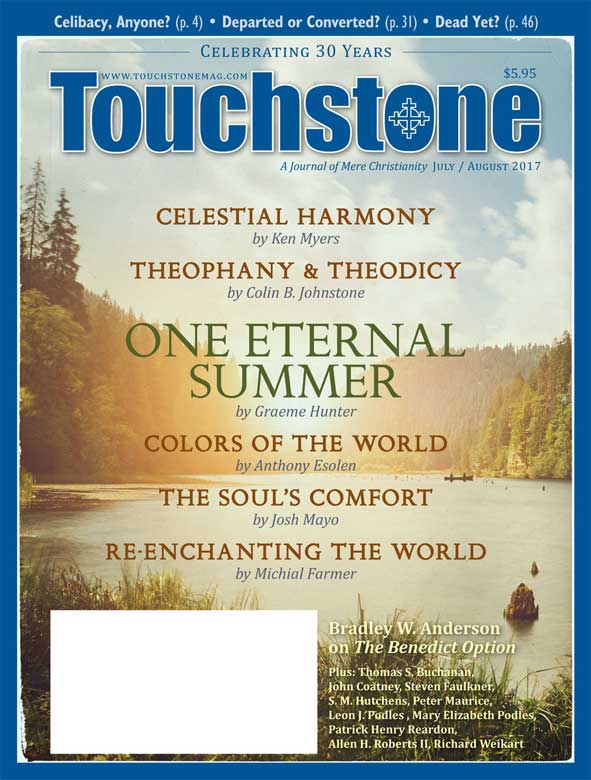Review
Secularists on Stilts
What Is a Human? What the Answers Mean for Human Rights
by John H. Evans
Oxford University Press, 2016
(272 pages, $35.00, hardcover)
reviewed by Richard Weikart
The debate has raged for centuries: Can secular philosophies provide a firm foundation for human rights, or do they rather undermine morality and human rights? In the Declaration of Independence, Jefferson famously wrote, "We hold these truths to be self-evident: that all men are created equal, that they are endowed by their Creator with certain inalienable rights, among these are life, liberty, and the pursuit of happiness." Can those who eliminate the Creator from their worldview still retain a belief in human rights?
A fascinating new sociological study by John H. Evans (University of California, San Diego) sheds new light on this old and perplexing question. His new sociological data, published in this book, provide fresh insights that should influence the direction of this debate in the future. Ultimately, this study demonstrates that secular views of humanity are less supportive of human rights than the Christian worldview.
We Christians may be tempted to declare victory, since Evans, even though he is not a Christian, seems to vindicate a significant critique of secular philosophies. Unfortunately, however, even if this triumphalism has some merit, it would nevertheless be premature, because when Evans reflects philosophically about the implications of his study, he tries to rescue the secular perspectives. He suggests that secular intellectuals simply tweak their rhetoric rather than make any substantive changes to their worldview. Thus, the debate will surely continue.
Evans notes that for a long time, critics of secularism, such as myself, have been arguing that secular philosophies undermine support for morality and human rights. (He briefly discusses my position as one example among others, though unfortunately he could not discuss my most recent contribution to this debate, The Death of Humanity and the Case for Life, since it was released after his book was in press).
Three Views of Humanity
Evans astutely identifies three main views of humanity (or anthropologies, to use his terminology) that prevail in academic discourse and are reflected in the American public: the theological, biological, and philosophical anthropologies. The theological anthropology is the Christian view that humans are created in the image of God. According to his survey, this is the view upheld by a majority of Americans.
The biological anthropology, which was upheld by about 25 percent of survey respondents, takes a more materialistic view of humans as merely biological organisms. Because it sees humans primarily as the product of random mutations over eons of time, "this anthropology portrays humans as objects" (9). A clear example of the biological anthropology is the geneticist Robert Haynes, president of the 16th International Congress of Genetics, who told that gathering that
for three thousand years at least, a majority of people have considered that human beings were special . . . it's the Judeo-Christian view of man. What the ability to manipulate genes should indicate to people is the very deep extent to which we are biological machines. The traditional view is built on the foundation that life is sacred . . . well, not anymore. It's no longer possible to live by the idea that there is something special, unique, even sacred about living organisms. (9–10)
Finally, about 15 percent of Americans uphold the philosophical anthropology, sometimes known as personhood theory, which teaches that humans only have value (or qualify as "persons") if they possess certain traits or abilities. Evans perceptively points out that personhood theorists often disagree among themselves about what traits count, though often rationality and self-consciousness top the list. When I debated Peter Singer on the radio show Unbelievable in May 2016, I challenged him about the arbitrariness of the traits he uses to define a person, and he did not have a viable answer. (A podcast of the Weikart-Singer debate is available online.)
To test people's respect for human rights, Evans conducted a survey in which he questioned respondents on their views on five major human rights issues: whether we should risk soldiers to stop a genocide, whether we should be allowed to buy kidneys from poor people, whether terminally ill people should commit suicide to save money, whether we should be allowed to take blood from prisoners without their consent, and whether we should torture terror suspects if it might save lives. What he discovered was that those embracing the biological and philosophical anthropologies were less likely to express support for protecting human rights than those maintaining a Christian view of humanity.
Further, he found that adherents of the Christian vision of humanity were more likely to view humans as being equal. One might think that almost all Americans would at least give lip service to human equality. But if Evans's study is accurate, this is not so. Evans found that 30 percent of respondents believed that people with greater abilities had greater value.
Secularist Counterflow
How should secular thinkers respond to Evans's study? One response would be to admit that secular perspectives do not comport with human rights, and so much the worse for human rights. Indeed, many secular intellectuals over the past couple of centuries have forthrightly dispensed with human rights because they do not see how such rights make sense in a godless world. Jeremy Bentham, the founder of utilitarian ethics in the late eighteenth and early nineteenth centuries, famously derided natural rights as "nonsense upon stilts." As I have shown in From Darwin to Hitler: Evolutionary Ethics, Eugenics, and Racism in Germany, many biologists and biologically inspired philosophers and social thinkers in Germany in the late nineteenth and early twentieth centuries forthrightly rejected human rights, based on their biological view of humanity.
This was not just a German phenomenon, either, for prominent Americans—also under the influence of secular views of humanity—also jettisoned human rights. Shockingly, one of the most famous jurists in twentieth-century America, the -Supreme Court Justice Oliver Wendell Homes, Jr., denied that humans have intrinsic rights, including the right to life. For this reason, Holmes supported not only compulsory sterilization (he wrote the infamous Buck v. Bell decision upholding compulsory sterilization laws), but also infanticide for those deemed biologically inferior.
The intellectual trajectory from Friedrich Nietzsche to Michel Foucault and other postmodernists, which is a powerful influence in academe today, especially in the humanities, also dismisses objective morality and human rights. Ironically, Foucault sometimes used human rights language, but he clearly did not believe humans had any intrinsic rights. Once, when debating Noam Chomsky, and again when debating some Maoists, Foucault insisted that mob violence was preferable to restoring justice or setting up revolutionary tribunals, because, he declared, justice is non-existent. Foucault stated, "When the proletariat takes power, it may be quite possible that the proletariat will exert towards the classes over which it has just triumphed, a violent, dictatorial, and even bloody power. I can't see what objection one could make to this"(The Chomsky-Foucault Debate, The New Press, 2006, 47–52). Contra Foucault, I can think of many reasons to oppose violent, bloody dictatorships.
Secular Inconsistencies
Evans greatly underestimates the tendency of intellectuals to deny the existence of human rights, stating, "Indeed, many academic proponents of the biological anthropology would probably consider themselves defenders of human rights" (24). He then provides Richard Dawkins as an example. He assumes that Dawkins wants to uphold human rights, because he is an honorary vice-president of the British Humanist Society, which espouses human rights. However, Evans ignores the many statements by Dawkins (and many other intellectuals upholding the biological anthropology) that flatly deny objective moral standards. For instance, Dawkins once stated, "The universe that we observe has precisely the properties we should expect if there is, at bottom, no design, no purpose, no evil, no good, nothing but pitiless indifference" ("God's Utility Function," Scientific American, Nov. 1995, 80–81). If Dawkins does indeed support human rights, then he is contradicting his overall worldview.
Dawkins is not alone in this conundrum. Many secular intellectuals argue that humans have no intrinsic value and that no objective morality exists, yet somehow they know better. They continually talk as though morality and human rights do exist, and they do seem to think that murder, rape, genocide, racism, greed, and such are really wrong. Jerry Coyne, evolutionary biologist at the University of Chicago, provides an instructive example here. Coyne insists that biological evolution "says that there is no special purpose for your life, because it is a naturalistic philosophy. We have no more extrinsic purpose than a squirrel or an armadillo. And it says that morality does not come from God. It is an evolved phenomenon" ("Conspiracy Road Trip," BBC Three, Oct. 8, 2012).
Indeed, in his book, Faith versus Fact, Coyne claims that morality could not be God-given, because it changes historically (this argument has no force, showing only that Coyne does not understand the Christian position on morality). In any case, he later argues that "secular morality, which is not twisted by adherence to the supposed commands of a god, is superior to most 'religious' morality"(Faith versus Fact, Viking, 2015, 261). Apparently it did not occur to Dr. Coyne that in order for one form of morality to be superior to another, there must be some objective, universal standard—which he denies elsewhere.
Further, many secular thinkers wax indignant when Christians or other theists accuse them of opening the door for violence and atrocities. Just dare to suggest that Hitler or Stalin was the product of secularizing influences, and the secular chorus will shout out that these fiends were betraying secularist principles. Indeed, many will blame Hitler's atrocities on Christianity (I dispatch this fallacy in my new book, Hitler's Religion). But why do they care to defend secularism against the charge of genocide, if nothing is good and nothing is evil? Apparently, many of them do think Hitler was evil, and many do believe in human rights, even though sometimes they overtly deny the existence of any objective morality.
A Better Response
What, then, should be the response of those secular thinkers who are unwilling to abandon human rights? My suggestion would be for them to rethink their worldview. If human rights are true and if objective morality exists, and if these are inconsistent with a non-theistic view of reality, perhaps they should reconsider the claims of theistic religions (especially Christianity). Indeed, there are many intellectually sound reasons to embrace Christianity, too many to enumerate here, but the existence of human rights and objective morality is surely a strong argument to favor it over non-theistic philosophies.
Finally, Evans provides two further suggestions for secular intellectuals who want to retain their commitments to human rights. First, he suggests that the way they undermine human rights is incidental to their core philosophy, so if they only modify their rhetoric slightly and affirm human rights more, this will solve the problem. I am skeptical about this proposal, however, for it ignores the fundamental ways that the biological and philosophical anthropologies strip human life of its purpose, value, and meaning. It also ignores the way that secular philosophies undermine objective moral standards, which are needed to underpin human rights.
Evans's second suggestion is to formulate a new anthropology, one that embraces a "secular yet sacred definition of a human" (189). The problem with this solution, once again, is one of consistency. If humans are simply cosmic accidents, then from whence does this "sacredness" come? From a meaningless, purposeless cosmos? This new anthropology would be borrowing what Evans thinks is worthwhile from the Christian vision of humanity, while dispensing with the Christian foundation.
I am thankful that Evans finds human rights compelling, rather than rejecting them, as some intellectuals do. I am also grateful that he is honest enough to admit that those upholding the Christian worldview have a greater tendency to promote human rights. I find it sad, however, that he has not yet come to embrace the conclusion that perhaps the reason Christians have a greater tendency to uphold human rights is because Christianity comports better with reality.
Richard Weikart is professor of history at California State University, Stanislaus, and author of From Darwin to Hitler: Evolutionary Ethics, Eugenics, and Racism in Germany and Hitler's Ethic: The Nazi Pursuit of Evolutionary Progress (both from Palgrave Macmillan). Some of his writings can be found at www.csustan.edu/history/faculty/weikart.
subscription options
Order
Print/Online Subscription

Get six issues (one year) of Touchstone PLUS full online access including pdf downloads for only $39.95. That's only $3.34 per month!
Order
Online Only
Subscription

Get a one-year full-access subscription to the Touchstone online archives for only $19.95. That's only $1.66 per month!
bulk subscriptions
Order Touchstone subscriptions in bulk and save $10 per sub! Each subscription includes 6 issues of Touchstone plus full online access to touchstonemag.com—including archives, videos, and pdf downloads of recent issues for only $29.95 each! Great for churches or study groups.
Transactions will be processed on a secure server.
more on book reviews from the online archives
more from the online archives
calling all readers
Please Donate
"There are magazines worth reading but few worth saving . . . Touchstone is just such a magazine."
—Alice von Hildebrand
"Here we do not concede one square millimeter of territory to falsehood, folly, contemporary sentimentality, or fashion. We speak the truth, and let God be our judge. . . . Touchstone is the one committedly Christian conservative journal."
—Anthony Esolen, Touchstone senior editor









